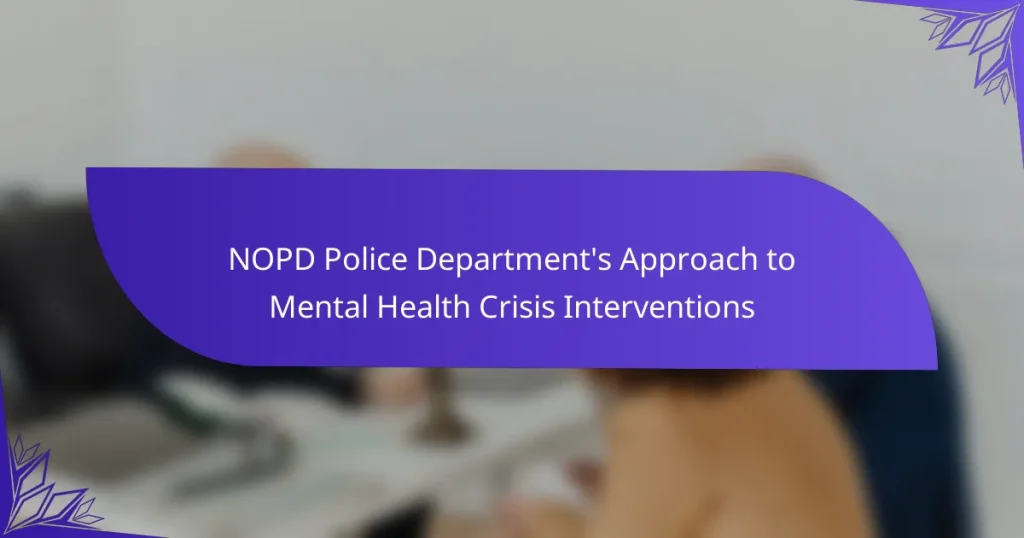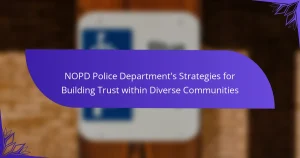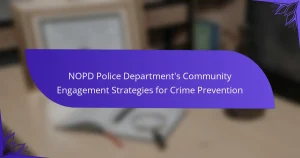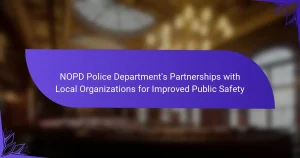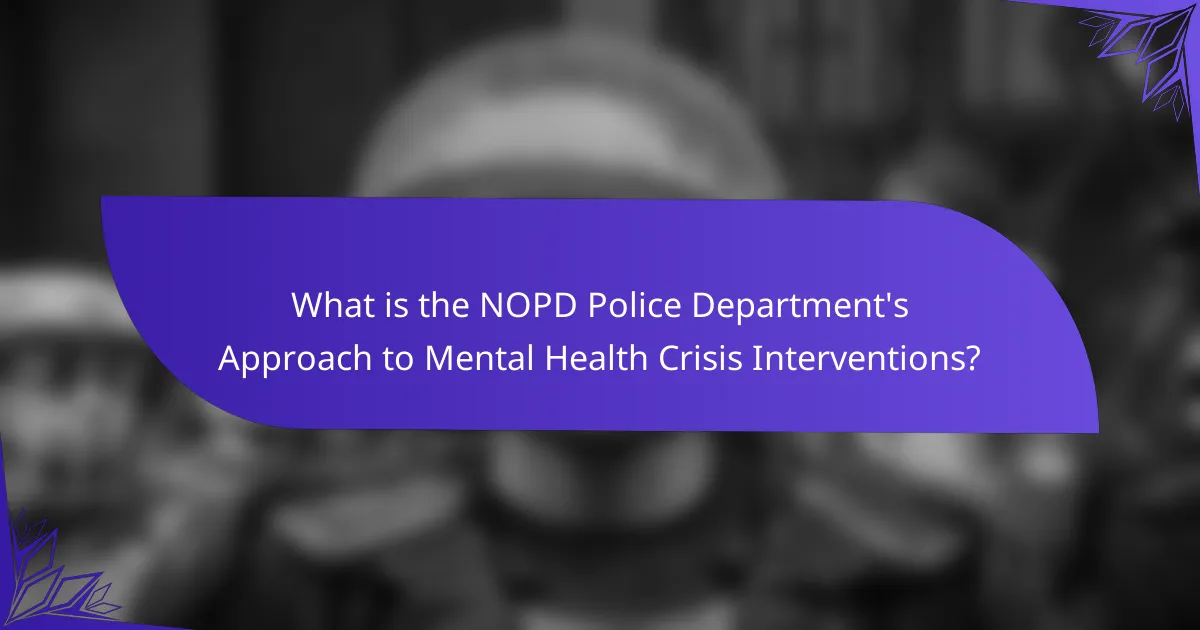
What is the NOPD Police Department’s Approach to Mental Health Crisis Interventions?
The NOPD Police Department employs a collaborative approach to mental health crisis interventions. This strategy involves partnerships with mental health professionals and community organizations. Officers receive specialized training to handle mental health crises effectively. The department utilizes a Crisis Intervention Team (CIT) model. This model enhances officers’ ability to de-escalate situations. It aims to connect individuals in crisis with appropriate mental health services. The NOPD also prioritizes the safety of all individuals involved. This approach reflects a commitment to community well-being and support.
How does the NOPD define mental health crisis interventions?
The NOPD defines mental health crisis interventions as specialized responses to individuals experiencing mental health emergencies. These interventions aim to de-escalate situations and connect individuals to appropriate mental health services. The NOPD employs trained officers and mental health professionals during these interventions. This approach seeks to prioritize safety for both the individual and the public. The NOPD’s mental health crisis intervention program is part of a broader strategy to improve community policing. This program reflects a commitment to addressing mental health issues compassionately and effectively. It aligns with national best practices in crisis intervention.
What are the key objectives of the NOPD’s approach?
The key objectives of the NOPD’s approach are to enhance community safety and improve mental health crisis responses. This strategy aims to provide appropriate interventions for individuals experiencing mental health crises. The NOPD seeks to reduce arrests and unnecessary hospitalizations through effective de-escalation techniques. Additionally, the approach emphasizes collaboration with mental health professionals. Training officers in mental health awareness is also a priority. The NOPD aims to build trust within the community by fostering positive relationships. These objectives are designed to create a more compassionate and effective policing model.
How does the NOPD identify mental health crises in the community?
The NOPD identifies mental health crises in the community through various methods. Officers receive training to recognize signs of mental health issues. They rely on community reports and calls for assistance. The department collaborates with mental health professionals for guidance. Data from previous incidents helps identify patterns of crises. The NOPD also engages in outreach programs to educate the public. These efforts aim to improve response times and outcomes. Community partnerships enhance the department’s ability to address mental health needs effectively.
Why is the NOPD’s approach to mental health crisis interventions important?
The NOPD’s approach to mental health crisis interventions is important because it prioritizes de-escalation and appropriate care. This method reduces the likelihood of violent encounters between law enforcement and individuals in crisis. By integrating mental health professionals into response teams, the NOPD can provide immediate support to those in need. Studies show that such interventions lead to better outcomes for individuals experiencing mental health crises. The approach also helps to build trust between the community and law enforcement. This is crucial in addressing the stigma surrounding mental health issues. Additionally, it contributes to overall public safety by ensuring that individuals receive the help they require.
What impact does mental health have on community safety?
Mental health significantly impacts community safety. Individuals with untreated mental health issues may exhibit behaviors that increase the risk of violence or crime. According to the National Alliance on Mental Illness, about 1 in 5 adults experience mental illness each year. This prevalence can lead to higher rates of interactions with law enforcement. Effective mental health interventions can reduce these interactions. Programs that address mental health crises can lead to safer communities. Research shows that crisis intervention teams reduce arrests and improve outcomes for individuals in crisis. Thus, prioritizing mental health is essential for enhancing overall community safety.
How can effective interventions reduce police involvement in mental health crises?
Effective interventions can reduce police involvement in mental health crises by providing appropriate support and resources. These interventions often include crisis intervention teams, mental health professionals, and community-based services. Programs like the Crisis Intervention Team (CIT) model train officers to recognize and respond to mental health issues effectively. Research shows that CIT programs can lead to a 23% reduction in arrests of individuals in crisis. Additionally, mobile crisis units staffed with mental health professionals can respond to emergencies, decreasing the need for police presence. A study by the National Alliance on Mental Illness indicates that such interventions improve outcomes for individuals experiencing crises. By addressing mental health needs directly, communities can lessen reliance on law enforcement.
What are the core components of the NOPD’s mental health crisis intervention strategy?
The core components of the NOPD’s mental health crisis intervention strategy include specialized training for officers, collaboration with mental health professionals, and the establishment of crisis intervention teams. Specialized training equips officers with skills to recognize and respond to mental health crises. Collaboration with mental health professionals ensures immediate support and resources for individuals in crisis. Crisis intervention teams consist of officers and mental health experts working together to de-escalate situations effectively. These components aim to enhance public safety and provide appropriate care for individuals experiencing mental health challenges.
What training do NOPD officers receive for mental health crisis situations?
NOPD officers receive Crisis Intervention Training (CIT) for mental health crisis situations. This training includes recognizing mental health issues and de-escalation techniques. Officers learn to communicate effectively with individuals in crisis. The program emphasizes empathy and understanding. CIT is designed to improve outcomes for both officers and individuals in distress. NOPD collaborates with mental health professionals during this training. The training is based on best practices and evidence-based approaches. This comprehensive program aims to enhance public safety and support mental health.
How does the NOPD collaborate with mental health professionals?
The NOPD collaborates with mental health professionals through specialized units and training programs. They have established partnerships with local mental health organizations. This collaboration aims to improve responses to individuals in crisis. Officers receive training on mental health issues and de-escalation techniques. Additionally, mental health professionals may accompany officers during certain calls. This approach helps ensure appropriate care for individuals experiencing mental health crises. The collaboration enhances community safety and supports individuals in need of mental health services.
How does the NOPD assess the effectiveness of its mental health crisis interventions?
The NOPD assesses the effectiveness of its mental health crisis interventions through data collection and analysis. They track outcomes of interventions, including the number of individuals successfully diverted to mental health services. The department also evaluates feedback from mental health professionals involved in the interventions. Additionally, they review incident reports to identify patterns and areas for improvement. Regular training sessions incorporate insights gained from these assessments. This systematic approach ensures continuous enhancement of their mental health response strategies.
What challenges does the NOPD face in implementing its approach?
The NOPD faces several challenges in implementing its approach to mental health crisis interventions. Limited resources hinder the department’s ability to provide adequate training for officers. Insufficient funding affects the availability of mental health professionals for collaboration. Additionally, community mistrust complicates engagement with individuals experiencing crises. Variability in mental health conditions creates unpredictability in responses. There is also a lack of standardized protocols across different divisions within the department. These challenges can lead to inconsistent outcomes during interventions. Addressing these issues is crucial for effective implementation.
How does community perception influence the NOPD’s mental health initiatives?
Community perception significantly influences the NOPD’s mental health initiatives. Positive community perceptions can lead to increased collaboration between the NOPD and local mental health organizations. This collaboration enhances resource allocation and program effectiveness. Conversely, negative perceptions may result in community resistance to police-led mental health initiatives. Such resistance can hinder outreach efforts and limit access to vulnerable populations. According to a study by the Vera Institute of Justice, community trust is essential for successful mental health crisis interventions. When communities view the NOPD as a supportive partner, they are more likely to engage with mental health programs. This engagement ultimately improves outcomes for individuals in crisis.
What resources are needed to enhance the NOPD’s approach?
To enhance the NOPD’s approach to mental health crisis interventions, additional training resources are needed. This includes specialized training for officers on mental health issues and crisis de-escalation techniques. Access to mental health professionals during interventions is also crucial. This collaboration can provide immediate support and guidance. Funding for mental health programs and services is essential to sustain these initiatives. Data collection and analysis tools can help evaluate the effectiveness of interventions. Community partnerships with mental health organizations can strengthen resources available to officers. Lastly, public awareness campaigns are necessary to educate the community about available mental health resources. These combined efforts can significantly improve the NOPD’s response to mental health crises.
What best practices can be derived from the NOPD’s approach to mental health crisis interventions?
The best practices derived from the NOPD’s approach to mental health crisis interventions include collaborative training, community partnerships, and crisis de-escalation techniques. Collaborative training involves law enforcement officers receiving mental health training alongside mental health professionals. This training enhances officers’ understanding of mental health issues and improves their response to crises. Community partnerships are established with local mental health organizations to provide resources and support. These partnerships enable a more comprehensive approach to mental health crises. Crisis de-escalation techniques focus on communication and empathy to reduce tensions during encounters. The NOPD has implemented these techniques effectively, resulting in a decrease in use-of-force incidents during mental health interventions.
How can other police departments learn from the NOPD’s experiences?
Other police departments can learn from the NOPD’s experiences by adopting their integrated approach to mental health crisis interventions. The NOPD has implemented specialized training for officers to handle mental health situations effectively. This training emphasizes de-escalation techniques and understanding mental health issues. Additionally, the NOPD collaborates with mental health professionals to provide immediate support during crises. This partnership enhances the overall response to mental health emergencies. Other departments can also analyze data from the NOPD’s interventions to improve their strategies. By reviewing outcomes and community feedback, they can refine their approaches. Implementing similar programs can lead to better crisis management and community relations.
What role can community members play in supporting mental health crisis interventions?
Community members play a crucial role in supporting mental health crisis interventions. They can provide immediate assistance by recognizing signs of a mental health crisis. Their involvement can help de-escalate situations before professional help arrives. Community members can also offer emotional support to individuals in distress. They can facilitate connections to local mental health resources and services. Active participation in training programs enhances their skills in crisis intervention. Research shows that community engagement reduces stigma around mental health issues. This collective effort fosters a supportive environment for those in need.
The main entity of this article is the NOPD Police Department and its approach to mental health crisis interventions. The article outlines the NOPD’s collaborative strategy that includes partnerships with mental health professionals, specialized officer training, and the implementation of a Crisis Intervention Team (CIT) model. Key objectives include enhancing community safety, reducing arrests, and improving mental health crisis responses. The article further examines how the NOPD identifies mental health crises, assesses the effectiveness of its interventions, and the challenges it faces, while highlighting the importance of community perception and support in these initiatives.
